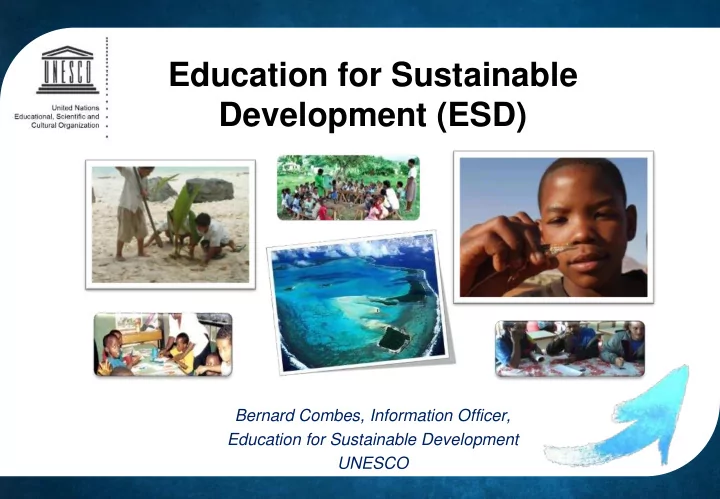

Education for Sustainable Development (ESD) Bernard Combes, Information Officer, Education for Sustainable Development UNESCO
Sustainable development cannot be achieved by technological solutions, political regulation or financial instruments alone. It can only be achieved if we change the way we think and act. For this change we need education.
Increased international recognition of ESD Education 2030 Framework for Action SDG Target 4.7, Target 12.8 & Target 13.3 UNGA Resolution 70/209 SAMOA Pathway - 3 rd International Conference on SIDS 2015-2025 MAB Strategy - Strategic Objective 3 Climate COP 21 Paris Agreement – Article 12 G7 Kurashiki Declaration Batumi Ministerial Statement on ESD
ESD Global Coordination by UNESCO Setting the ESD Global Agenda Building New Momentum: Launch Commitments Harnessing Partnerships: Partner Networks Fostering a Global Community of Practice: G lobal Forum and Online Clearinghouse Showcasing Good Practice: UNESCO-Japan Prize for ESD
The Education SDG Target 4.7 of Goal 4 calls for: " by 2030 all learners acquire knowledge and skills needed to promote sustainable development, including among others through education for sustainable development and sustainable lifestyles, human rights, gender equality, promotion of a culture of peace and non-violence, global citizenship, and appreciation of cultural diversity and of culture’s contribution to sustainable development". http://en.unesco.org/sdgs/ed
“Addressing the SDGs through ESD” publication concise guidance on learning content and approaches to teach key sustainable development challenges structured along the SDGs, providing age-specific learning content for each SDG also addressing key competencies needed to implement the SDGs, as well as transformative pedagogies to teach them
Monitoring of Target 4.7 contribute to monitoring SDG Target 4.7 provide inputs for overall monitoring of SDG 4 contribute to online database for reporting initiatives related to Target 4.7 develop thematic reports related to Target 4.7
Global Action Programme (GAP) on ESD Priority Action Areas Advancing policy 1 Transforming learning and training environments 2 Building capacity of educators and trainers 3 Empowering and mobilizing youth 4 Accelerating sustainable solutions at local level 5
Creating momentum – GAP Commitments ESD stakeholders invited to make GAP Commitments 365 GAP Launch commitments received from stakeholders in 80 countries prior to the 2014 World Conference on ESD currently a total of more than 500 GAP commitments Make a commitment at: https://unesco4esd.crowdmap.com/
Harnessing partnerships – Partner Networks 5 Partner Networks established for GAP implementation 85 organizations from around the world are Key Partners developing flagship projects for each Priority Action Area Members of Partner Networks: http://en.unesco.org/gap/partner-networks/members
Fostering a Global Community of Practice GAP ESD Clearinghouse set up for information sharing access to news, events, knowledge, experiences and resources within the ESD global community of practice includes an online ESD Resource Bank GAP ESD information folder produced contribute to the GAP ESD Clearinghouse: https://en.unesco.org/gap-esd-clearinghouse
Sharing knowledge and experiences developing an ESD & SDG matrix of good practices disseminating the ESD Zoom electronic newsletter identifying and highlighting amazing Pathfinders for Change changers involved in ESD contribute to the UNESCO Green Citizens initiative: http://en.unesco.org/greencitizens/
Developing learning and training materials UNESCO/UNEP YouthXchange guidebook series: climate, biodiversity, green skills takes into account challenges, opportunities, good practices and case studies on global challenges and explores the links with sustainable lifestyles ESD key publications: http://en.unesco.org/themes/education- sustainable-development/clearinghouse/publications
Showcasing Good Practice 2015 & 2016: First editions of the UNESCO-Japan Prize on ESD 6 winning organizations from Cameroon, Germany, Guatemala & El Salvador, Indonesia, Japan and the United Kingdom Participate in the 2017 Prize call for nominations: http://en.unesco.org/prize-esd/nomination
Timeline • UNESCO World Conference on ESD launches the Global Action Programme (GAP) on ESD 2014 • First meeting of Partner Networks • Launch of online GAP ESD Clearinghouse 2015 Activities of Members of Partner • Global Review Forum for the GAP on ESD Networks • Mid-term report on the GAP on ESD 2017 • Progress report on GAP implementation to UNGA 72 Flagship Projects • Global Review Forum for the GAP on ESD • Final report on the 1 st phase of the GAP on ESD 2019
b.combes@unesco.org
Recommend
More recommend